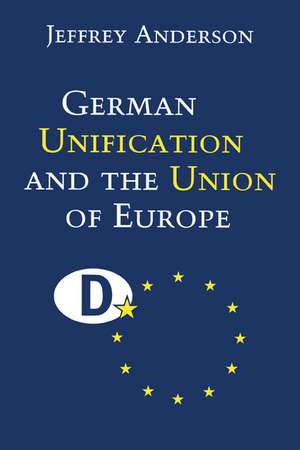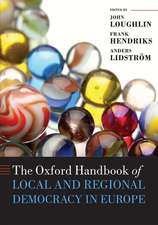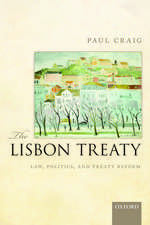German Unification and the Union of Europe: The Domestic Politics of Integration Policy
Autor Jeffrey Andersonen Limba Engleză Paperback – 9 iun 1999
| Toate formatele și edițiile | Preț | Express |
|---|---|---|
| Paperback (1) | 283.79 lei 6-8 săpt. | |
| Cambridge University Press – 9 iun 1999 | 283.79 lei 6-8 săpt. | |
| Hardback (1) | 717.87 lei 6-8 săpt. | |
| Cambridge University Press – 9 iun 1999 | 717.87 lei 6-8 săpt. |
Preț: 283.79 lei
Nou
Puncte Express: 426
Preț estimativ în valută:
54.31€ • 56.49$ • 45.45£
54.31€ • 56.49$ • 45.45£
Carte tipărită la comandă
Livrare economică 15-29 martie
Preluare comenzi: 021 569.72.76
Specificații
ISBN-13: 9780521643900
ISBN-10: 0521643902
Pagini: 240
Ilustrații: 1 b/w illus. 1 map 5 tables
Dimensiuni: 152 x 229 x 14 mm
Greutate: 0.36 kg
Ediția:New.
Editura: Cambridge University Press
Colecția Cambridge University Press
Locul publicării:Cambridge, United Kingdom
ISBN-10: 0521643902
Pagini: 240
Ilustrații: 1 b/w illus. 1 map 5 tables
Dimensiuni: 152 x 229 x 14 mm
Greutate: 0.36 kg
Ediția:New.
Editura: Cambridge University Press
Colecția Cambridge University Press
Locul publicării:Cambridge, United Kingdom
Cuprins
1. A new Germany in Europe?; 2. Unification and 'Germany in Europe'; 3. Continuity in trade and internal market; 4. Mixed outcomes in energy and environment; 5. Change in competition policy; 6. Change in structural funds and the CAP; 7. A new Germany in Europe.
Recenzii
"Jeffery Anderson's study offers a vitual gold mine of new empirical data on the Federal Republic's policies towards the EU. Its meticulous empirical research and careful analysis of concrete case studies makes an important contribution to the growing literature on Germany's role in European integration and will be of inestimable value to scholars and researchers working in the field." German Politics and Society Spring 2001
"the greatest strengths of Anderson's book is that his analytical framework based on interests, institutions, and ideas captures not only such basic contours of German policies toward Europe, but sheds light on the many nuances of change and continunity in different policy sectors over time, and thus allows for a differentiated and dynamic understanding of Germany's role in Europe...It will be indispensable reading for students of German politics, European integration, and comparative public policy in advanced industrial societies." German Studies Review 2002
"Anderson provides solid empirical evidence... Scholars will benefit greatly from the use of his analytic framework, and the arguement will long continue to pose a significant challenge to those who claim that Germany's foreign policy will now be shaped primarily by external forces and its growing power on the European and international scene." Beverly Crawford, International Relations
"the greatest strengths of Anderson's book is that his analytical framework based on interests, institutions, and ideas captures not only such basic contours of German policies toward Europe, but sheds light on the many nuances of change and continunity in different policy sectors over time, and thus allows for a differentiated and dynamic understanding of Germany's role in Europe...It will be indispensable reading for students of German politics, European integration, and comparative public policy in advanced industrial societies." German Studies Review 2002
"Anderson provides solid empirical evidence... Scholars will benefit greatly from the use of his analytic framework, and the arguement will long continue to pose a significant challenge to those who claim that Germany's foreign policy will now be shaped primarily by external forces and its growing power on the European and international scene." Beverly Crawford, International Relations
Descriere
This book explores the effects of Germany's unification in 1990 on its policies toward the European Union.















